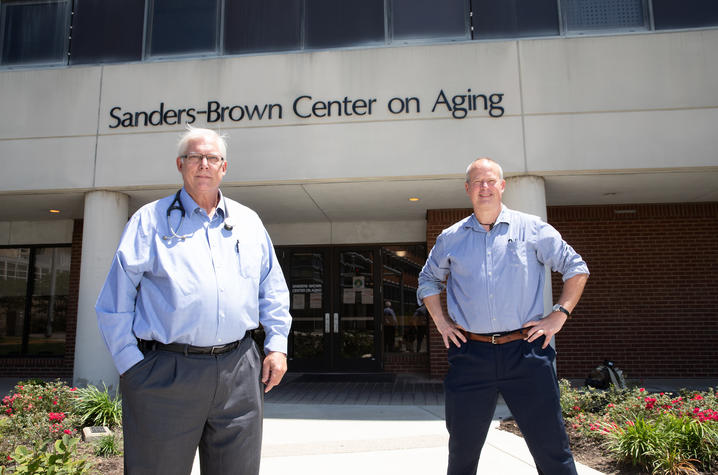UK Begins 1st Clinical Trial in the World for Newly Discovered Form of Dementia
The motivation driving the work of Pete Nelson, M.D., Ph.D., is personal. His grandmother, Sylvia Becker, died with Alzheimer's disease, and he says his mother then grew terrified of developing the disease.
“It gives me purpose in life to attack that,” Nelson said. As an experimental neuropathologist at the University of Kentucky’s Sanders-Brown Center on Aging, he is guided by that motivation. “It is most every researcher’s dream to help identify and classify a disease, and then to go on and help beat it.”
Nelson, who is the R.C. Durr Foundation Chair in Alzheimer's Disease at UK, accomplished the first part of that dream back in 2019, when a group of international researchers, co-chaired by Nelson, discovered a new form of dementia named limbic-predominant age-related TDP-43 encephalopathy, more commonly known as LATE.
Symptoms of LATE mimic Alzheimer’s disease by causing memory loss and problems with thinking and reasoning in old age. But researchers found the LATE-affected brain looks very different from the Alzheimer's brain.
Now a couple of years after this discovery, Nelson is working towards the second part of the dream, with the world’s first clinical trial for LATE officially underway by his colleagues at the University of Kentucky.
Greg Jicha, M.D., Ph.D., is director of clinical trials at Sanders-Brown and leader of one of the best clinical dementia teams in the country.
“Our collaboration with the basic scientists as always is key. We couldn’t have done this without Dr. Nelson's discoveries,” said Jicha. “For the first time ever, we are looking at folks participating in our research who we think are heading down the path of Alzheimer’s, but now by checking simple blood tests and sometimes spinal fluid, we may be able to say while it looks like Alzheimer’s symptomatically … it is actually LATE.”
*****
Ned and Lu-Ann Farrar were married in 1984. They’ve done many things in their nearly 40 years as a team, including raising two children while both pursuing meaningful careers. Most recently, their teamwork has been focused on Ned's health.
In 2018, after retiring from teaching orchestra in Fayette County Public Schools, Ned was diagnosed with Alzheimer’s disease. He took part in an earlier study at Sanders-Brown and was in the evaluation process for another when they refined his diagnosis to LATE, which Nelson and his team had just discovered.
“I asked Dr. Jicha if this was good news or bad news and he told us that anytime someone tells you your brain is not full of beta-amyloid, that is a good thing,” said Lu-Ann.
Jicha then told the Farrars that there were plans in the works for a trial regarding LATE and that he would keep them updated. About three months ago, they got the call.
“Ned is research subject number one, which is pretty exciting,” said Lu-Ann.
The Farrars have called Lexington home for decades now, and they say it is truly a blessing that the place making these groundbreaking discoveries and then advancing them towards a potential treatment is right in their backyard. Sanders-Brown not only helps evaluate and treat Ned, but they also give LuAnn guidance by providing honest, knowledgeable and compassionate answers.
“I’m not a researcher, but I am pretty sure you can’t fix something if you don’t know what it is. Research and clinical trials may seem like the long road, but it is so foundational to real, effective treatments,” said LuAnn. “Their commitment to curing these diseases is profound, evidenced by the work they do every day, including thoughtful consideration of Ned and his diagnosis and his treatment options.”
